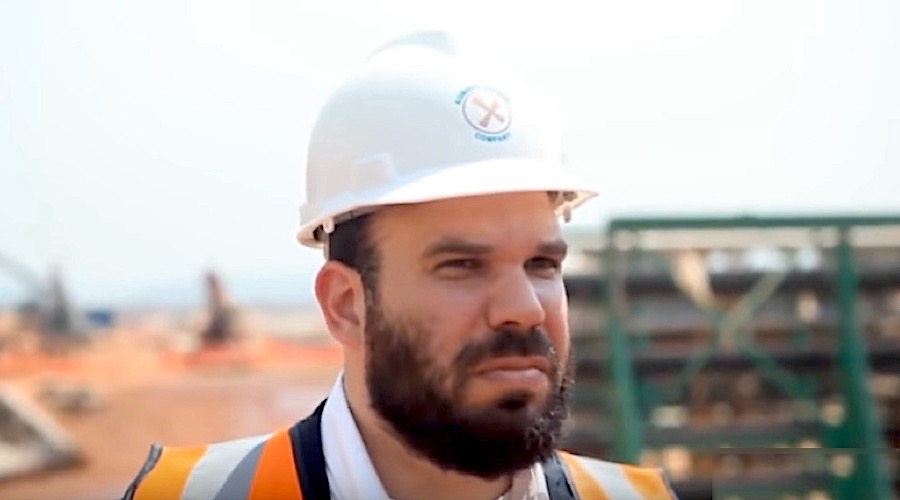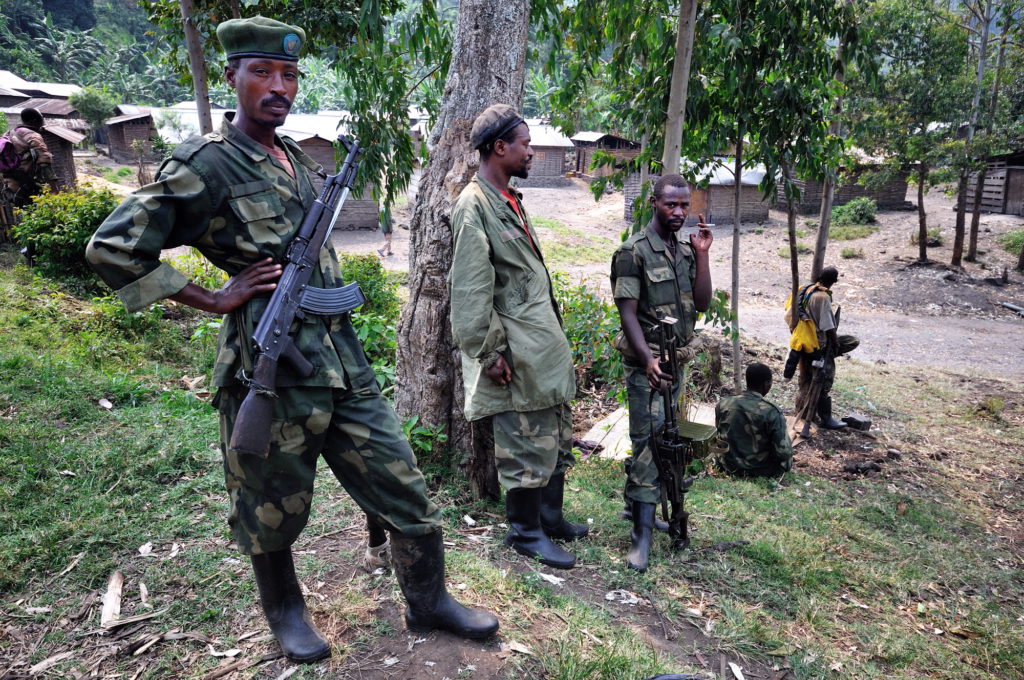Biden open to easing sanctions on billionaire Gertler in return for Congo exit
Bloomberg News | May 16, 2024 |

Israeli billionaire Dan Gertler, pictured here. (Image: Bloomberg Markets via YouTube.)
The US government is open to easing sanctions on billionaire mining magnate Dan Gertler if he gives up his business operations and assets in the Democratic Republic of Congo, where Washington’s interest in critical minerals has run up against his problematic royalties ownership.

The Treasury Department is willing to grant limited sanctions relief to Gertler, an Israeli citizen, as a way to get him to exit from Congo completely, including relinquishing his royalty streams on three strategic projects, according to two US officials, who asked not to be identified as the talks are ongoing.
The mines are rich in copper and cobalt, a key ingredient in most electric vehicle batteries and which is almost exclusively mined in Congo. While Chinese miners have thrived in the Central African country, Western investors have been reluctant, in part because of a legacy of corruption.
The US sanctioned Gertler in 2017 for what it said were hundreds of millions of dollars’ worth of opaque and corrupt mining and oil deals in Congo under the previous administration of President Joseph Kabila. In the waning days of his presidency, Donald Trump granted Gertler a one-year reprieve after repeated requests from the Israeli government, but that was canceled early in the Biden administration.
The willingness to loosen sanctions to purge Gertler from the projects stems in part from the US push to boost investments in critical minerals needed for electric vehicles from sources not tied to Chinese firms that dominate the industry. The US stance was first reported by the New York Times.
Biden reimposes sanctions on mining magnate Dan Gertler
Gertler has never been charged with a crime and denies any wrongdoing. Gertler and his US-based lawyers didn’t respond to emailed requests for comment.
He cut a deal with Congo in 2022 to give back some of his assets in exchange for help lobbying the US government to lift his sanctions. But as part of the agreement, he retained his royalties in the world’s biggest non-Chinese sources of cobalt.
Those royalty streams have enriched Gertler by hundreds of millions of dollars from metal projects owned by Eurasian Resources Group and Glencore Plc, according to calculations made by Congo Is Not For Sale, a consortium of Congolese and international anti-corruption groups.
The difficulty stopping the ongoing royalty payments and the inevitable depletion of the mining assets prompted the US to make the offer after long debate, according to an official with direct knowledge of the talks who asked not to be identified discussing private conversations.
Glencore declined to comment, while ERG didn’t respond to emails requesting comment. Congo’s government didn’t immediately provide comment when contacted Thursday by text message, and the office of President Felix Tshisekedi didn’t respond to text messages requesting comment.
“To pay him again for things he acquired illegally and from which he’s already profited, for me, truly, it’s rewarding corruption,” said Jean Claude Mputu, spokesman for Congo is Not for Sale. “We should not being paying Gertler any more,” and Congo’s government should claw back previous payments, he said.
Mputu, who received a State Department international anti-corruption award in December, is one of several people and organizations facing lawsuits from Gertler for their investigations into him.
Gertler will be required to drop those cases as part of any sanctions relief, according to the official with knowledge of the offer. He will also need to submit to an audit of his assets and put half of any proceeds of his royalty sales in escrow, the person said.
The license is not a full lifting of sanctions and will allow the US government to reinstate them.
Gertler grew up in one of Israel’s most prominent diamond families. He first came to Congo in 1997 to trade diamonds and struck up a friendship with Kabila that led to billions of dollars worth of investments in minerals and oil blocks.
(By Iain Marlow, Daniel Flatley and Michael J. Kavanagh)
Bloomberg News | May 16, 2024 |

Israeli billionaire Dan Gertler, pictured here. (Image: Bloomberg Markets via YouTube.)
The US government is open to easing sanctions on billionaire mining magnate Dan Gertler if he gives up his business operations and assets in the Democratic Republic of Congo, where Washington’s interest in critical minerals has run up against his problematic royalties ownership.

The Treasury Department is willing to grant limited sanctions relief to Gertler, an Israeli citizen, as a way to get him to exit from Congo completely, including relinquishing his royalty streams on three strategic projects, according to two US officials, who asked not to be identified as the talks are ongoing.
The mines are rich in copper and cobalt, a key ingredient in most electric vehicle batteries and which is almost exclusively mined in Congo. While Chinese miners have thrived in the Central African country, Western investors have been reluctant, in part because of a legacy of corruption.
The US sanctioned Gertler in 2017 for what it said were hundreds of millions of dollars’ worth of opaque and corrupt mining and oil deals in Congo under the previous administration of President Joseph Kabila. In the waning days of his presidency, Donald Trump granted Gertler a one-year reprieve after repeated requests from the Israeli government, but that was canceled early in the Biden administration.
The willingness to loosen sanctions to purge Gertler from the projects stems in part from the US push to boost investments in critical minerals needed for electric vehicles from sources not tied to Chinese firms that dominate the industry. The US stance was first reported by the New York Times.
Biden reimposes sanctions on mining magnate Dan Gertler
Gertler has never been charged with a crime and denies any wrongdoing. Gertler and his US-based lawyers didn’t respond to emailed requests for comment.
He cut a deal with Congo in 2022 to give back some of his assets in exchange for help lobbying the US government to lift his sanctions. But as part of the agreement, he retained his royalties in the world’s biggest non-Chinese sources of cobalt.
Those royalty streams have enriched Gertler by hundreds of millions of dollars from metal projects owned by Eurasian Resources Group and Glencore Plc, according to calculations made by Congo Is Not For Sale, a consortium of Congolese and international anti-corruption groups.
The difficulty stopping the ongoing royalty payments and the inevitable depletion of the mining assets prompted the US to make the offer after long debate, according to an official with direct knowledge of the talks who asked not to be identified discussing private conversations.
Glencore declined to comment, while ERG didn’t respond to emails requesting comment. Congo’s government didn’t immediately provide comment when contacted Thursday by text message, and the office of President Felix Tshisekedi didn’t respond to text messages requesting comment.
“To pay him again for things he acquired illegally and from which he’s already profited, for me, truly, it’s rewarding corruption,” said Jean Claude Mputu, spokesman for Congo is Not for Sale. “We should not being paying Gertler any more,” and Congo’s government should claw back previous payments, he said.
Mputu, who received a State Department international anti-corruption award in December, is one of several people and organizations facing lawsuits from Gertler for their investigations into him.
Gertler will be required to drop those cases as part of any sanctions relief, according to the official with knowledge of the offer. He will also need to submit to an audit of his assets and put half of any proceeds of his royalty sales in escrow, the person said.
The license is not a full lifting of sanctions and will allow the US government to reinstate them.
Gertler grew up in one of Israel’s most prominent diamond families. He first came to Congo in 1997 to trade diamonds and struck up a friendship with Kabila that led to billions of dollars worth of investments in minerals and oil blocks.
(By Iain Marlow, Daniel Flatley and Michael J. Kavanagh)
Bloomberg News | May 15, 2024 |

M23 troops in Bunagana, Democratic Republic of the Congo. Credit: Wikimedia Commons
Democratic Republic of Congo called for an international embargo of metal exports from neighboring Rwanda, whose government it accuses of using rebel groups to steal its natural resources.

All mining products from Rwanda should be considered “blood minerals,” because their sale allegedly supports conflict in eastern Congo, Mines Minister Antoinette N’Samba Kalambayi said in a May 8 statement released on Tuesday. “All stakeholders, including end consumers of mining products,” should commit to a responsible supply chain, and “an embargo be decreed against Rwanda,” she said.
The minister’s plea follows the takeover earlier this month of Congo’s largest mines of tantalum, a key mineral in portable electronics, by the M23 rebel group. Congo and United Nations experts say M23 is backed by Rwanda, which is now receiving the smuggled tantalum and warehousing it for future sale, she said.
Rwanda’s government has repeatedly denied it supports M23. Last month, government spokesperson Yolande Makolo told Bloomberg that accusations that Rwanda is stealing minerals is “a scapegoating strategy” by the Congolese government to cover up its own “security and governance failures.” Makolo didn’t respond to a request for comment Wednesday.
Eastern Congo’s minerals have fueled conflict for decades and international efforts to stop it have had limited success.
Exports of tin ore, tantalum, tungsten ore and gold from the region are supposed to be certified and tagged through several initiatives to enable buyers to identify the source of their metal purchases. In reality, many of those tracing systems are collapsing as conflicts proliferate throughout eastern Congo, leading to the displacement of more than 6 million people.
Last month, lawyers for Congo’s government complained to Apple Inc. that it was supporting the war by indirectly buying stolen minerals through Rwanda for its products. Apple said it did due diligence on its supply chain and found no links to conflict.
The M23 has been Congo’s chief concern since the group launched its most recent rebellion in late 2021 amid worries that the rights of ethnic Tutsis were under threat in the country. The group has surrounded the city of Goma since the beginning of the year, blocking key trade routes and expanding its territory.
The trade in minerals from the region is worth billions of dollars annually. A large share escapes formal export channels. In some cases, armed groups profit from the sales.
Minerals have become a pillar of Rwanda’s formal economy in recent years, with exports nearing $1 billion over the past fiscal year, Rwandan central bank data shows. Rwanda’s entire gross domestic product is about $14 billion, according to the International Monetary Fund.
(By Michael J. Kavanagh)
No comments:
Post a Comment